Bringing Hope to Sierra Leone
By Lin Pei-fei (林裴菲)
Photos by Hsiao Yiu-hwa (蕭耀華)
Abridged and translated by Huang Yung-ping (黃永平)
Syharn Shen (沈思含)
Bringing Hope to Sierra Leone
By Lin Pei-fei (林裴菲)
Photos by Hsiao Yiu-hwa (蕭耀華)
Abridged and translated by
Huang Yung-ping (黃永平)Syharn Shen (沈思含)
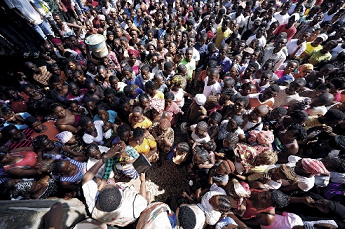
Tzu Chi has worked together with local charities to hold aid distributions in Sierra Leone, where many people struggle everyday to survive and support their families.
For many, the mention of Sierra Leone may conjure up scenes from the 2006 movie Blood Diamond set during the country's civil war, a bloody conflict triggered in part by a power struggle over the control of diamond mines. The civil war lasted for 11 years from 1991 to 2002, killed at least 50,000 lives, and left 2 million people displaced. Even to this day, the scars of war are still visible in the villages and on the streets of the West African country.
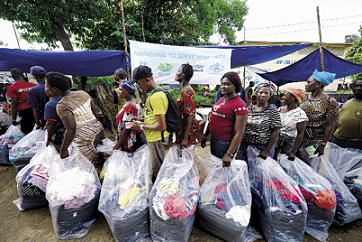
Local residents lined up to receive Tzu Chi's blankets and secondhand clothing, which can keep them warm after temperatures drop at night.
Recently, Sierra Leone was brought to international attention again in the Ebola virus outbreak of 2014. By the time the World Health Organization declared the end of the outbreak in the country for a second time in March 2016, there were more than 14,000 confirmed cases and nearly 4,000 deaths. The virus epidemic destroyed families, damaged the health care system, and devastated the local economy.
It was in 2015, during the Ebola epidemic, that Tzu Chi started working with local charity organizations to deliver aid to Sierra Leone. Over the years, Tzu Chi has partnered with Caritas Freetown, Healey International Relief Foundation (HIRF) and Lanyi Foundation to offer long-term aid and care to local people in need.
Travelling to Sierra Leone
In August 2019, the capital city of Freetown was hit by severe flash floods. Houses were inundated, and survivors living in coastal and lowland areas desperately needed help. Upon learning of the disaster, Tzu Chi, Caritas Freetown, and the HIRF immediately worked together to distribute emergency aid supplies. Lanyi Foundation also used the rice donated by Tzu Chi to cook hot meals for the local survivors.
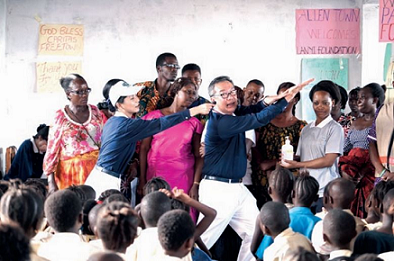
Dr. Teh Soon-hian also demonstrated the correct steps of washing one's hands to schoolchildren in Allen Town, Freetown.
Tzu Chi also formed a relief team to travel to Sierra Leone and hand out supplies to the local survivors and people in need. As a Tzu Chi Foundation staff, I volunteered to join the team and was granted permission by Dharma Master Cheng Yen (證嚴法師).
In mid-November 2019, after 32 hours of flights, transit time, and a boat ride, we finally arrived to the country ravaged by poverty, disease, and disasters. Our relief team—with Tzu Chi members from Malaysia, South Africa, Taiwan, and the United States—were to hold 18 aid distributions in 9 days with the help of our local partners.
Distributing Aid in Freetown
In Freetown's Cline Town area, we had very limited time to prepare for our aid distribution in Culvert community. The supplies were to arrive late due to traffic, and we had difficulties confirming the number of people in our aid recipients' households.
The weather was scorching hot with temperatures as high as 31°C (or 87.8°F). People's shirts were soaked in sweat, and some locals waiting in line were starting to turn impatient. Thankfully, Dr. Teh Soon-hian (鄭順賢) from Hualien Tzu Chi Hospital started to teach the locals how to wash their hands. By doing demonstrations and giving a health talk, he drew their attention and kept them focused and calm.
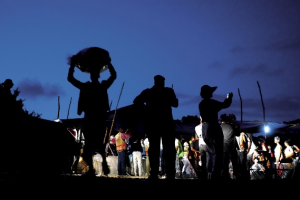
In Freetown’s Culvert community, Tzu Chi handed out aid supplies to 500 households affected by the floods. With the aid of lighting devices, the distribution went on after the sky turned dark.
As the sun began to set, there were still many people waiting to receive their supplies. Everyone in the relief team tried their best to speed up the distribution process, hoping to finish before dark. But, time passed by and darkness set in.
We were grateful for the lighting devices brought by the HIRF staff to facilitate our work, and by the time we finished the distribution, it was already 7 p.m. Seeing the recipients return to their homes with our supplies, we were all relieved and could finally catch our breath before moving on to prepare for our next distribution.
The Plight of Ebola Survivors
During our time in Sierra Leone, we also visited a community of Ebola survivors in Bo District, Southern Province. When we arrived, the women welcomed us with enthusiastic singing and dancing. Their bright and colorful clothing caught my attention immediately.
A woman in orange sang a song in Krio—the common language in Sierra Leone—expressing how Ebola spread, took lives, and left those infected debilitated and aching in pain. As some survivors lost their relatives to the epidemic, all they had was one another's support in the community.
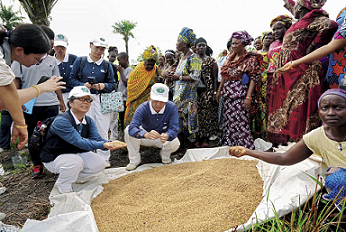
Lanyi Foundation and Tzu Chi have helped a community of Ebola survivors to learn how to cultivate rice. With two harvests a year, the locals can now support themselves. |
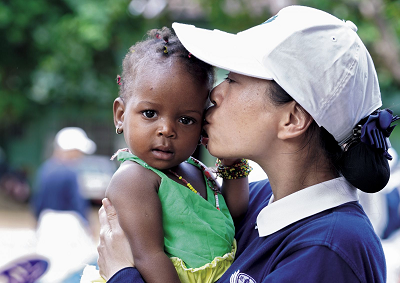
Our team chanced upon an adorable baby, and I couldn't help myself from giving her a kiss on her cheek. |
Our partner organizations tried to encourage the locals to see and treat the survivors as normal, ordinary people. While the rice we brought could offer temporary relief, I had a strong feeling that love and care was what the survivors needed more.
Bringing Hope to the Youth
We also visited youth detention centers to hand out supplies, and I noticed that for many young locals in the center, their families were supported by women alone.
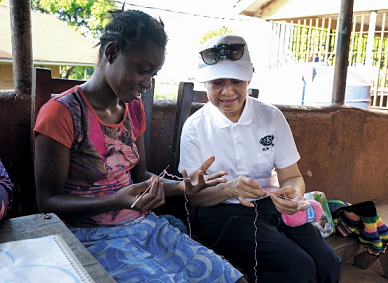
Dr. Chen Pao-chu teaches knitting techniques to a girl at a youth detention center.
With a father figure missing while growing up, many young people may not have enough guidance and end up doing things that have altered their lives. A girl at the center, for example, had accidentally killed a person when trying to protect herself and her mother against violence. When Dr. Chen Pao-chu (陳寶珠) taught her how to knit, the girl picked up the skill quickly. She was smart and talented, but she lacked opportunities to learn.
And when our volunteer Andrew Liu (劉鏡鏘) shared about Tzu Chi with local youths, many boys listened to him attentively. One of them expressed his hope to receive an education after his release from the detention center. We wished him all the best, hoping that in the future, he can become a person who can give to others in need.
Reflections from the Visit
After returning to Taiwan, I had to readjust to life at home. But, I also started to see and appreciate things in my life that I didn’t notice before. I now have more gratitude towards the people around me as well.
Our visit to Sierra Leone this time is only part of a long-term effort to spread Tzu Chi's values of love and compassion in the country. There is still so much that needs to be done. Thoughts of how to carry out the Master’s wish and Tzu Chi’s mission to transform lives in Africa have lingered in my mind. I believe that change can happen only when we help locals to support themselves, work with each other, and live together in peace. I also hope that more people can join our cause to make a difference in Africa.
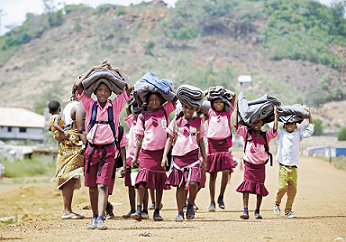
Children smile as they carry blankets and multigrain powder from Tzu Chi. Most of them come from poor families and often don’t have anything to eat for breakfast.

Tzu Chi has worked together with local charities to hold aid distributions in Sierra Leone, where many people struggle everyday to survive and support their families.
For many, the mention of Sierra Leone may conjure up scenes from the 2006 movie Blood Diamond set during the country's civil war, a bloody conflict triggered in part by a power struggle over the control of diamond mines. The civil war lasted for 11 years from 1991 to 2002, killed at least 50,000 lives, and left 2 million people displaced. Even to this day, the scars of war are still visible in the villages and on the streets of the West African country.

Local residents lined up to receive Tzu Chi's blankets and secondhand clothing, which can keep them warm after temperatures drop at night.
Recently, Sierra Leone was brought to international attention again in the Ebola virus outbreak of 2014. By the time the World Health Organization declared the end of the outbreak in the country for a second time in March 2016, there were more than 14,000 confirmed cases and nearly 4,000 deaths. The virus epidemic destroyed families, damaged the health care system, and devastated the local economy.
It was in 2015, during the Ebola epidemic, that Tzu Chi started working with local charity organizations to deliver aid to Sierra Leone. Over the years, Tzu Chi has partnered with Caritas Freetown, Healey International Relief Foundation (HIRF) and Lanyi Foundation to offer long-term aid and care to local people in need.
Travelling to Sierra Leone
In August 2019, the capital city of Freetown was hit by severe flash floods. Houses were inundated, and survivors living in coastal and lowland areas desperately needed help. Upon learning of the disaster, Tzu Chi, Caritas Freetown, and the HIRF immediately worked together to distribute emergency aid supplies. Lanyi Foundation also used the rice donated by Tzu Chi to cook hot meals for the local survivors.

Dr. Teh Soon-hian also demonstrated the correct steps of washing one's hands to schoolchildren in Allen Town, Freetown.
Tzu Chi also formed a relief team to travel to Sierra Leone and hand out supplies to the local survivors and people in need. As a Tzu Chi Foundation staff, I volunteered to join the team and was granted permission by Dharma Master Cheng Yen (證嚴法師).
In mid-November 2019, after 32 hours of flights, transit time, and a boat ride, we finally arrived to the country ravaged by poverty, disease, and disasters. Our relief team—with Tzu Chi members from Malaysia, South Africa, Taiwan, and the United States—were to hold 18 aid distributions in 9 days with the help of our local partners.
Distributing Aid in Freetown
In Freetown's Cline Town area, we had very limited time to prepare for our aid distribution in Culvert community. The supplies were to arrive late due to traffic, and we had difficulties confirming the number of people in our aid recipients' households.
The weather was scorching hot with temperatures as high as 31°C (or 87.8°F). People's shirts were soaked in sweat, and some locals waiting in line were starting to turn impatient. Thankfully, Dr. Teh Soon-hian (鄭順賢) from Hualien Tzu Chi Hospital started to teach the locals how to wash their hands. By doing demonstrations and giving a health talk, he drew their attention and kept them focused and calm.

In Freetown’s Culvert community, Tzu Chi handed out aid supplies to 500 households affected by the floods. With the aid of lighting devices, the distribution went on after the sky turned dark.
As the sun began to set, there were still many people waiting to receive their supplies. Everyone in the relief team tried their best to speed up the distribution process, hoping to finish before dark. But, time passed by and darkness set in.
We were grateful for the lighting devices brought by the HIRF staff to facilitate our work, and by the time we finished the distribution, it was already 7 p.m. Seeing the recipients return to their homes with our supplies, we were all relieved and could finally catch our breath before moving on to prepare for our next distribution.

Lanyi Foundation and Tzu Chi have helped a community of Ebola survivors to learn how to cultivate rice. With two harvests a year, the locals can now support themselves.
The Plight of Ebola Survivors
During our time in Sierra Leone, we also visited a community of Ebola survivors in Bo District, Southern Province. When we arrived, the women welcomed us with enthusiastic singing and dancing. Their bright and colorful clothing caught my attention immediately.
A woman in orange sang a song in Krio—the common language in Sierra Leone—expressing how Ebola spread, took lives, and left those infected debilitated and aching in pain. As some survivors lost their relatives to the epidemic, all they had was one another's support in the community.

Our team chanced upon an adorable baby, and I couldn't help myself from giving her a kiss on her cheek.
Our partner organizations tried to encourage the locals to see and treat the survivors as normal, ordinary people. While the rice we brought could offer temporary relief, I had a strong feeling that love and care was what the survivors needed more.
Bringing Hope to the Youth
We also visited youth detention centers to hand out supplies, and I noticed that for many young locals in the center, their families were supported by women alone.

Dr. Chen Pao-chu teaches knitting techniques to a girl at a youth detention center.
With a father figure missing while growing up, many young people may not have enough guidance and end up doing things that have altered their lives. A girl at the center, for example, had accidentally killed a person when trying to protect herself and her mother against violence. When Dr. Chen Pao-chu (陳寶珠) taught her how to knit, the girl picked up the skill quickly. She was smart and talented, but she lacked opportunities to learn.
And when our volunteer Andrew Liu (劉鏡鏘) shared about Tzu Chi with local youths, many boys listened to him attentively. One of them expressed his hope to receive an education after his release from the detention center. We wished him all the best, hoping that in the future, he can become a person who can give to others in need.
Reflections from the Visit
After returning to Taiwan, I had to readjust to life at home. But, I also started to see and appreciate things in my life that I didn’t notice before. I now have more gratitude towards the people around me as well.
Our visit to Sierra Leone this time is only part of a long-term effort to spread Tzu Chi's values of love and compassion in the country. There is still so much that needs to be done. Thoughts of how to carry out the Master’s wish and Tzu Chi’s mission to transform lives in Africa have lingered in my mind. I believe that change can happen only when we help locals to support themselves, work with each other, and live together in peace. I also hope that more people can join our cause to make a difference in Africa.

Children smile as they carry blankets and multigrain powder from Tzu Chi. Most of them come from poor families and often don’t have anything to eat for breakfast.
Contact Us | Plan a Visit | Donate
8 Lide Road, Beitou 11259, Taipei, Taiwan
886-2-2898-9999
005741@daaitv.com
©Tzu Chi Culture and Communication Foundation
All rights reserved.
